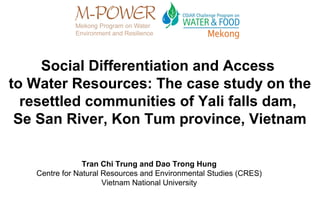
Social Differentiation and Access to Water Resources
- 1. Social Differentiation and Access to Water Resources: The case study on the resettled communities of Yali falls dam, Se San River, Kon Tum province, Vietnam Tran Chi Trung and Dao Trong Hung Centre for Natural Resources and Environmental Studies (CRES) Vietnam National University
- 2. The study site The Yali hydropower was commissioned in 2001. Ko n Tu m & & && & && & && & && & & & & & & & & & Sa Thay T $ Yaly dam district & Chu Pah & & district Moving about 6,782 people & Gia La i CAMBODIA belongs to 1,735 households of 4 ethnic groups (Kinh, Ro Ngao, Ba Na and Gia Rai) Hanoi N Le g e n d Kon Tum Boundary Gia Lai & Res ettle d village s & Dow nstream villages T $ Yali dam 100 0 100 200 Kil omet er s River Ho Chi Minh City Roa d
- 3. Key research questions 1. How have the villagers been using the resources after they had resettled and what institutional factors impact their use? 2. What are the differences within the community in use of resources and other resources in terms of gender, age, kinship, ethnicity, socioeconomic status, and class? 3. How have the resettlement program affected the local people differently? 4. Under which condition and terms different groups of people have participated in water governance and how has this affected their livelihoods?
- 4. The initial findings The household resource system has totally changed and the local people have faced more difficulties. Mono-crop based agriculture of cassava
- 5. The initial findings (cont’) Semi-flooded land – the provincial people committee allocated to the hydropower management board.
- 6. The initial findings (cont’) Lack of consultation & participation in the resettlement process
- 7. The initial findings (cont’) Compensation packages planned but not fair & transparent.
- 8. The initial findings (cont’) Reponses to the challenges of the resettlement site have been made but not effective.
- 9. Conclusion • Gaps in understanding the complicated situation of the resettlement site would lead to ineffectiveness in responses to their challenges. • The resettled people and local authorities have not had a voice in the trade-offs negotiation process and have been suffering the consequences of the losses.
- 10. Thank you very much for your attentions!
